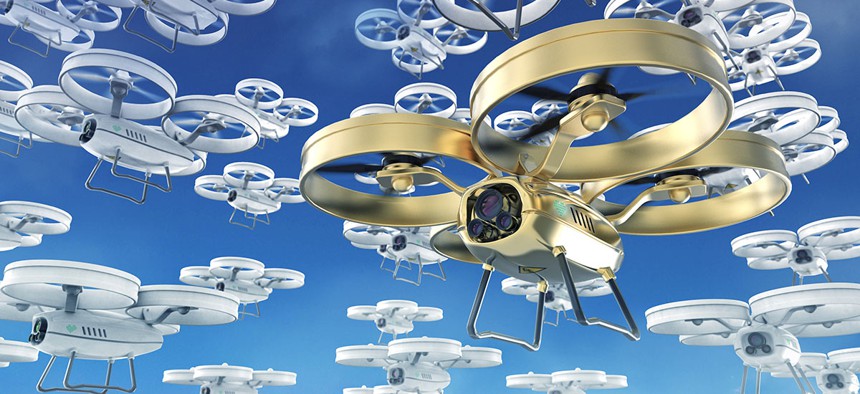Wanted by the Military: An 'Ender’s Game' Controller for Urban Robot Swarms

archy13/Shutterstock.com
The Pentagon is looking for a single controller to enable dismounted ground troops to steer "hundreds" of drones for urban warfare.
In "Ender’s Game," humans use simple gestures, voice commands and other low-bandwidth signals to command whole fleets of unmanned ships. Now, the U.S. military is looking for something similar, to help develop battle-drone tactics for next-generation urban warfare.
The OFFensive Swarm Enabled Tactics Program, or OFFSET, seeks to help foot soldiers wield the rapidly advancing power of drone swarms, and that starts with creating a controller—“An advanced human-swarm interface to enable users to monitor and direct potentially hundreds of unmanned platforms simultaneously in real time,” as the Defense Advanced Research Projects Agency put it Wednesday.
“If we’re successful, this work could also bring entirely new scalable, dynamic capabilities to the battlefield, such as distributed perception, robust and resilient communications, dispersed computing and analytics, and adaptive collective behaviors,” program manager Timothy Chung said in the DARPA statement.
The program also seeks a virtual environment that would “support a physics-based, swarm tactics game” that would allow operators to “rapidly explore, evolve and evaluate swarm tactics to see which would potentially work best on various unmanned platforms in the real world. Users could submit swarm tactics and track their performance from test rounds on a leaderboard, as well as dynamically interact with other users.”
The program builds on previous efforts to build more smarts and collaborative capability onto small drone platforms, such as DARPA’s Collaborative Operations in Denied Environment, or CODE, program.
In February 2015, the Marines tested an autonomous ground robot-quadcopter team for urban operations, a project called Unmanned Tactical Autonomous Control and Collaboration. The goal, eventually, is robot teams that can take on more of the risks associated with urban warfare.
“In the future, where we would like to go is use one of the ground robots that we’re currently using in the Marine Corps and a UAV and, say, pick someone out in the crowd or look for a certain vehicle, or something like that,” Lt. Col. James Richardson Jr. explained at the time.
Say we know what Patrick looks like and have something flying around and on the ground," he said. "We can say, ‘We’re looking for Patrick because he’s a bad actor. Find him.’ Then the system can take a photo and say, ‘We found him. This is where they’re located.’”
The U.S. Army also has its Micro-Autonomous Systems Technology effort to develop swarms of insect drones.
The Office of Naval Research has been leading the military in actual swarm robotics demonstrations, beginning with a swarming robot boat demonstration on Virginia’s James River in 2014. This summer, the office showed that several small drones launched from a cannon could perform choreographed aerial maneuvers, part of the Low-Cost UAV Swarming Technology program.
But the most impressive examples of swarm technology come from academia. In 2012, University of Pennsylvania researchers demonstrated how a distributed swarm could play the James Bond theme.
And in August 2014, Radhika Nagpal of Harvard showed she could write software that would command 1,024 microbots to create new shapes.
Looks like playtime is over.
“Unmanned air vehicles (UAVs) and unmanned ground vehicles (UGVs) have long proven beneficial in such difficult urban environs, performing missions such as aerial reconnaissance and building clearance," DARPA said in its OFFSET release. "But their value to ground troops could be vastly amplified if troops could control scores or even hundreds—‘swarms’—of these robotic units at the same time.”






